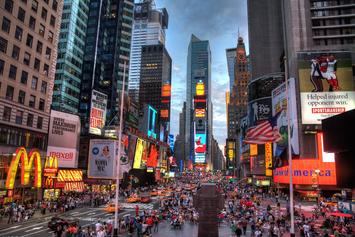
After a year of violence and unrest, large American cities serve as a cautionary tale for the progressives in Washington who want to move the country further to the left. The Democrats’ airtight lock on the urban vote has allowed political leaders to pursue ideological agendas without fear of reprisal, which has revealed just how much the elite left – comprised mostly of affluent, liberal whites who dominate media narratives – is out of step with the concerns of rank-and-file urban residents.
Take crime. “Defund the police” was always an unworkable project, but that never stopped progressives from working on it. Rep. Rashida Tlaib’s infamous “no more policing…it can’t be reformed” may have been more extreme than the Democratic norm, but its basic sentiment dominates the elite left’s obsession with policing injustices and relative indifference to street violence. White House press secretary Jen Psaki’s inability to acknowledge America has a crime problem is but one example of the conventional left’s unwillingness to depart from the standard script.
Meanwhile, the five cities that reduced their police budgets the most in 2020 (Austin, New York, Minneapolis, Seattle, and Denver) saw murders spike over the past year well above the national average. Thirty-six of the 50 largest cities in America saw murders rise at double-digit rates. Compared to 2020, shootings and homicides in Chicago, New York, and Los Angeles were way up. Crime in large progressive urban strongholds far outpaces more moderate and right-leaning cities.
Minority and urban residents know exactly what is going on, which is why we have seen mayoral candidates in New York City recently pivot to crime as a top issue. In a May 2021 poll, more than 60 percent of New Yorkers supported increasing the city’s police budget, and a plurality named crime as their number one issue in this year’s mayoral race. In July 2020, as protestors and rioters filled city streets across the country, 81 percent of Black Americans said in a Gallup poll they would like police to spend the same amount of time or more time in their neighborhoods. In Minneapolis, the epicenter of the “defund the police” movement, Black residents were more opposed than white residents to reducing the size of the city’s police force and more likely to perceive that crime had increased. In poll after poll, nationally and locally, city dwellers and racial minorities have consistently been at odds with the elite left’s views of urban policing.
Schooling is another example of the elite left’s disconnect with urban residents. Bill DeBlasio’s declaration during his failed 2020 presidential campaign that he “hated the privatizers” and wanted to “get away from charter schools” was merely a blunt articulation of the leftward drift of the Democratic elite over the past 20 years. The party’s platforms have become increasingly hostile to charter schools since the 2000 presidential election, as Jonathan Chait has documented.
Despite this trend, Democratic voters in cities like their charter schools — and want more of them. A recent poll in New York City found that 70 percent of Democrats favor opening more charter schools, a figure that grows higher among Black primary voters and Hispanics. A majority of Democratic voters said they would prefer a mayoral candidate who supports charter schools as well as traditional public schools.
Read the rest of this piece at AEI.org.
Ryan Streeter is a senior fellow and director of domestic policy studies at the American Enterprise Institute (AEI), where he oversees research in education, technology, housing, poverty studies, workforce development, and public opinion. Before joining AEI, he was executive director of the Center for Politics and Governance at the University of Texas at Austin.
Photo: Terrabass via Wikimedia under CC 3.0 License













NYC mayoralty
I'd be careful about over-interpreting the results of this race. It's far from clear that progressives are on the run in the Apple.